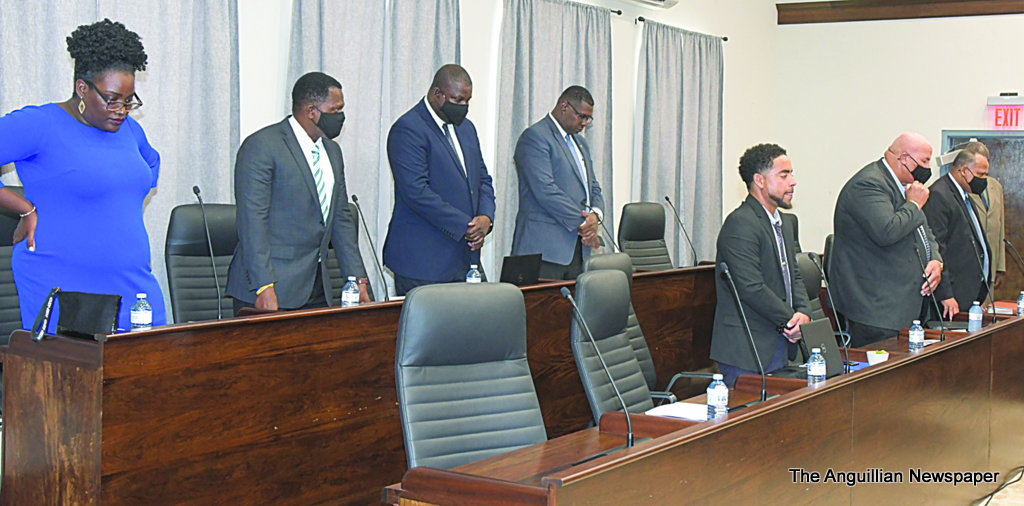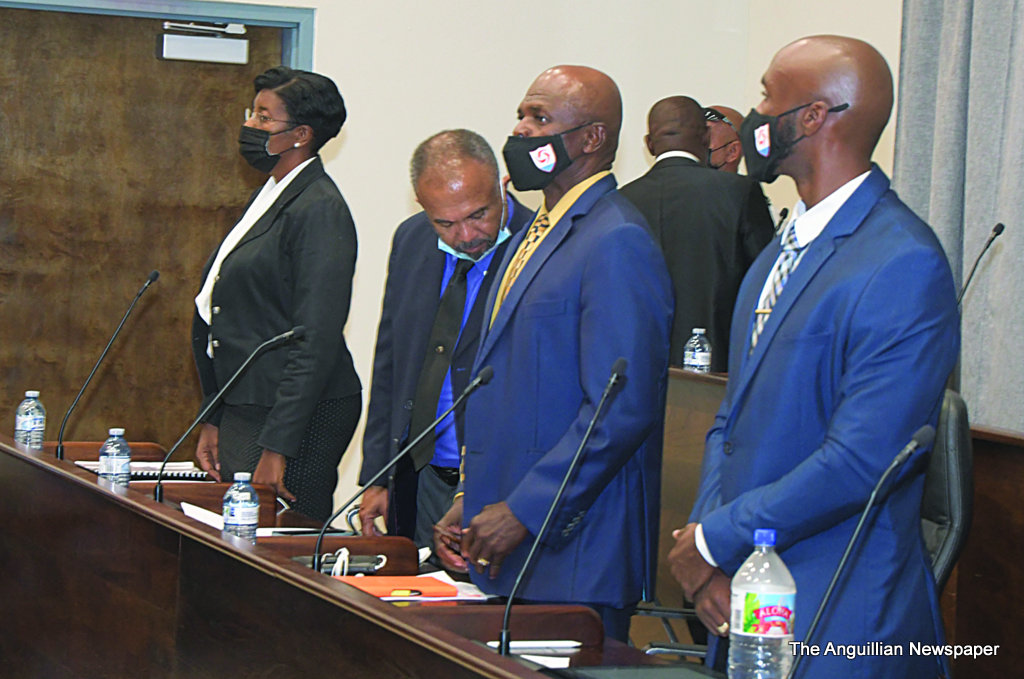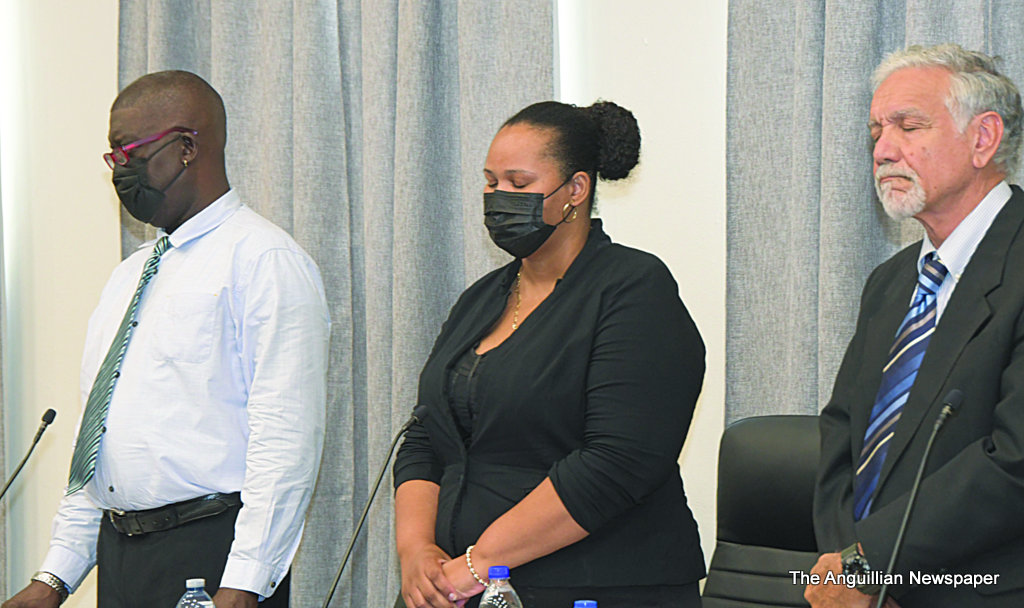The three expert advisors to the Anguilla House of Assembly-appointed Select Committee, established to consider the two petitions of the Concerned Citizens on the Bill for the Goods and Services Tax 2021, have turned in their final report.
They did so with a set of recommendations which may be too late – if the Bill is given its second and third readings on Friday, July 29, and passed.
If, for some reason the legislation is delayed, there will be some time to make adjustments which might address some of the objections of the Anguillian public, already burdened with various other taxes and fees. The GST is projected to fetch an annual revenue of 79.4 million dollars and is slated to come into operation on July 1, 2022.
The report was presented to the House of Assembly on Monday afternoon, July 26. The expert advisors, who spoke about the views of a number of witnesses and their own concerns, were: Dr. Wycliffe Fahie, a doctor of economics with significant experience in finance and taxation; Mr. David Carty, a former Speaker of the House of Assembly who noted, among other matters, that Anguilla was the smallest island in the world with a Goods and Services Tax; and Ms. Glenneva Hodge a National Youth Ambassador.
The report was introduced into the House of Assembly by the Chairman of the Select Committee: Deputy Speaker, Mr. Merrick Richardson. In doing so, he told the Speaker, Mrs. Barbara Webster-Bourne: “As the report indicates in paragraph 11, the submission of the petitions and the formation of the Select Committee was the first of its kind in Anguilla’s forty-five-year parliamentary history and a watershed in Anguilla’s democracy. It was an honour for me to be part of this historic process.”
He continued: “I would like to congratulate the petitioners for exercising their democratic right when they demanded that the Assembly they elected, consider their concerns. It is a testament to the growing maturity of our parliamentary practice that the people of this country can engage with their Assembly in a meaningful and constructive way…”
Following are the recommendations of the Select Committee as overseen and reported by the expert advisors and signed by Mr. Merrick Richardson:
The Recommendations
35. Two opinion streams were clear throughout the Committee’s work; Government feels that it must move forward with GST and the people felt that Government should find an alternative and implement it at a “better time”. The recommendations of the Committee are structured around these two opinions as well as a general set of recommendations.
36. The Committee recommends that if the Government of Anguilla does not progress with the implementation of GST it must:
a. Re-examine the proposal for GST. Government must seek to find an alternative that is simpler, equitable, more efficient and less intrusive to replace the model being progressed. This must be part of a broader fiscal policy. The objective of this broader fiscal policy should be to ensure the stability of Anguilla’s finances and to enable the government of Anguilla to meet its current and future financial obligations while at the same time supporting the ability of Anguillians and Anguillian businesses to meet their own needs and aspirations.
b. Revisit its own budget and urgently undertake the implementation of meaningful budgetary cuts. During this difficult period, the GoA must demonstrate its own commitment to the principle of shared sacrifice. The Committee is of the opinion that it is unfair and indeed destabilising to expect a frail and weakened private sector to bear the full burden of the Government’s shortfall on its own. This applies if does and if it does not.
37. If the Government of Anguilla progresses with the implementation of GST it must:
a. Address the data gap. Government must examine the assumptions upon which the current GST model was developed to verify their validity post Irma and amid a devastating health pandemic. It must test those assumptions to verify their strength in the face of future shock of a similar or more extreme form. This must be done before implementation of GST or any other alternative.
b. Implement a robust education plan: Priority must be placed on ensuring that there is a clear understanding, by all concerned, of the proposal. A clear strategy for ongoing taxpayer education must be developed and implemented by the Inland Revenue Department. This will address the concerns about compliance and unintentional criminilisation.
c. Consider the impact on the people of Anguilla. The Committee recommends the commissioning of a socio-cultural impact assessment, to analyse the impact of the proposed GST or any other alternative measure on the people of Anguilla. The Committee notes that it is Government’s policy to conduct environmental impact assessments before granting approval for large developments, which may potentially affect the natural environment. These assessments normally contain a social impact component. The Committee feels strongly that a similar approach should be taken with major policy decisions, such as tax reform.
d. Ensure IRD readiness. The IRD must be positioned to administer the GST as intended. The GoA should conduct an audit of IRD to assess its readiness and as a matter of priority, ensure that any recommendations of this audit are followed through.
38. Revisit the Report of the Public Accounts Committee Inquiry into Government’s Financial Standing and Obligations published October 31st, 2019. The GoA should revisit the recommendations of the PAC and prioritise the implementation of the relevant recommendations.
39. The Anguilla House of Assembly should extend the life of the Select Committee and widen its mandate to include the consideration of alternatives to GST; to examine parts of the legislation that leave people and the business community particularly vulnerable and to propose amendments to the Assembly on the same.
40. The Anguilla House of Assembly must engage in further outreach to ensure that its constituents understand how the Assembly and its Committees work. This is critical if the Assembly is to build the confidence and trust of its constituents. The Committee endorses the recommendation of the CPA Benchmark Assessment:
“RECOMMENDATION 18
A range of outreach activities, including integrating civic education into the school curriculum could be explored that works to increase public engagement with the House but that importantly, instils the fundamental importance of the institution of parliament to democracy in Anguilla.”
41. The House Services Department must seek to further develop its capacity to provide the administrative and technical support required for House committees to function. The work of Committees is critical to the Assembly. Appropriate support will ensure that Committees the Assembly establishes, are supported to a level that allows them to achieve their mandate and respond to the dynamic nature of the legislative environment. In particular, the Committee recommends that the House Services Department establish a more efficient system for the generation of transcripts of public hearings. The current system relies on the work of Court Reporters who are otherwise engaged in their substantive posts and who, in addition to Committee transcripts, produce transcripts for the Assembly when in plenary.
Hon Merrick Richardson
Chairperson











